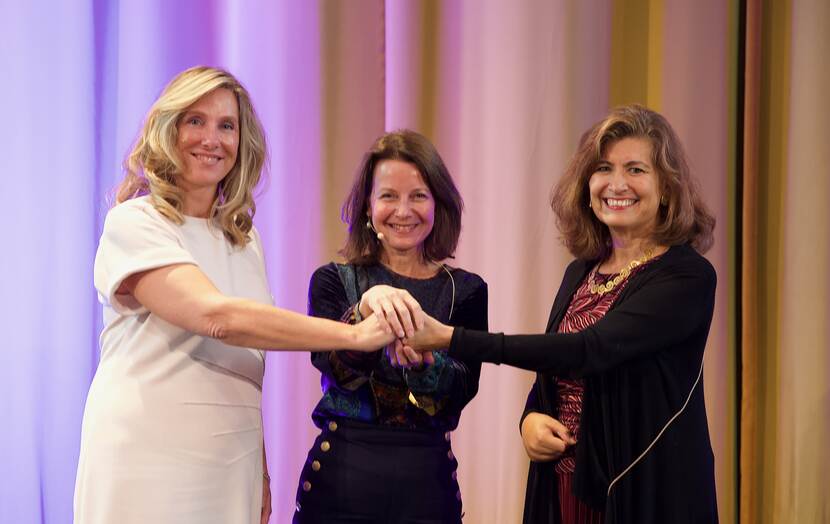UNESCO-EC-Netherlands AI Supervision Collaboration
Designing Institutional Frameworks for the Ethical Governance of AI in the Netherlands
5th of October 2023, the Hague, the Netherlands. UNESCO’s Social and Human Sciences Sector, the European Commission and the Dutch Authority for Digital Infrastructure are launching a project Supervising AI by Competent Authorities, financed through the European Commission’s Technical Support Instrument (TSI).
- What type of institutional arrangements do we need to govern AI effectively?
- How can we even contemplate governing a technology that is so rapidly proliferating and embedding itself in every industrial and economic domain?
- How can we ensure that regulations are sufficiently adaptive to keep pace with the technology without stifling innovation?
Complex questions such as these now dominate global AI discourse, preoccupying policymakers, regulators, and citizens worldwide.
Today, in a major step towards generating solutions that work, UNESCO has formalized its cooperation with the European Commission’s DG-Reform and the Dutch Authority for Digital Infrastructure to analyze the optimal institutional design for AI supervision in compliance with the EU AI Act and UNESCO’s Recommendation on the Ethics of AI.
AI represents one of the greatest challenges humanity is facing. While AI technologies have already demonstrated their unique potential to bolster development, they have presented us with a long list of societal challenges and potential risks.
Inspector General Angeline van Dijk of the Dutch Authority for Digital Infrastructure (RDI): “Governments and international organizations are grappling with important questions about the consequences, governance and technical and ethical consequences of AI. It is important to capitalize on the opportunities that AI offers, without neglecting its risks. The collaboration with UNESCO helps us enormously as a supervisor of AI in this important social task. The global UN framework 'Ethics of AI' serves as a framework, in which technological opportunities are balanced with human rights safeguards and security, energy and climate objectives.”
To assist the Dutch authorities in this complex task, UNESCO will produce a comprehensive report on the state of play and existing practices of AI supervision in Europe and beyond. UNESCO will develop a series of case studies on AI supervision, produce a set of best practices for dealing with specific cases and issues on AI supervision, and organize training sessions to improve institutional capacity.
Promoting ethical development and application of emerging technologies is one of UNESCO’s core functions. Recognizing the unprecedented transformative power of AI, UNESCO’s Member States adopted the Recommendation on the Ethics of AI in November 2021, as a global standard for ethical AI governance. The Recommendation is built on universal values and principles and provides policy guidance across eleven areas for more effective AI regulation and oversight.
“This is not a technological discussion. It is a societal one. We are talking about the kind of world we want to live in,” said Gabriela Ramos, UNESCO Assistant Director-General for Social and Human Sciences. “To shape the technological development of AI, we need effective governance frameworks underpinned by the ethical and moral values we all hold dear.”
UNESCO is currently assisting over fifty countries in applying the Recommendation and its provisions. The process involves assessing the state of governance in the different countries and supporting the next steps of tailor-made recommendations and action plans to fill policy gaps, align existing laws, and develop new legislation that addresses AI risks.
This collaborative project will enable Competent Authorities across the European Union to build the capacity and competencies required to effectively ensure compliance of AI systems with the requirements that will be set out by the EU AI Act, and in-line with Recommendation on the Ethics of AI.
Beyond the EU, the experience will enrich UNESCO’s work with all Member States by helping to develop benchmarks for institutional readiness and frameworks for stronger, safer and more ethical AI deployment.

More information
Additional Information about the Project
Specific actions to be taken by the parties include:
UNESCO:
- Produce a comprehensive report on the state of play and existing practices of AI supervision in Europe and beyond is produced and disseminated to the Working Groups’ members.;
- Develop a series of case studies on AI supervision and hold discussions with the Working Groups’ members;
- Produce a set of best practices for dealing with specific cases and issues on AI supervision, disseminate it to the Working Groups’ members, and organize the relevant trainings;
- Explore pathways and options on operational settings of AI supervision among Competent Authorities and present them to relevant stakeholders;
- Provide assistance to Competent Authorities in implementing the recommendations (to be re-assessed 12 months after the project launch)
The Dutch Authority for Digital Infrastructure:
- Facilitate UNESCO’s contact with the competent authorities of other EU member countries, for the research on the existing practises of AI supervision in Europe, development of case studies, and production of a set of best practices for dealing with specific cases and issues on AI supervision.
- Provide feedback to UNESCO on the analytical outputs under development for rapid incorporation and reflection in the documents.
- Help UNESCO organize meetings, workshops, and other events in the scope of this project.
- Promote the use of the knowledge products produced through this collaboration among the national authorities of the Netherlands, as well as with the authorities of other EU countries, as relevant.
The DG-Reform of the EC:
a. provide the technical support for the above elaborated activities through the Technical Support Instrument.
b. assist in scaling up this project for the benefit of other interested EU Member States.